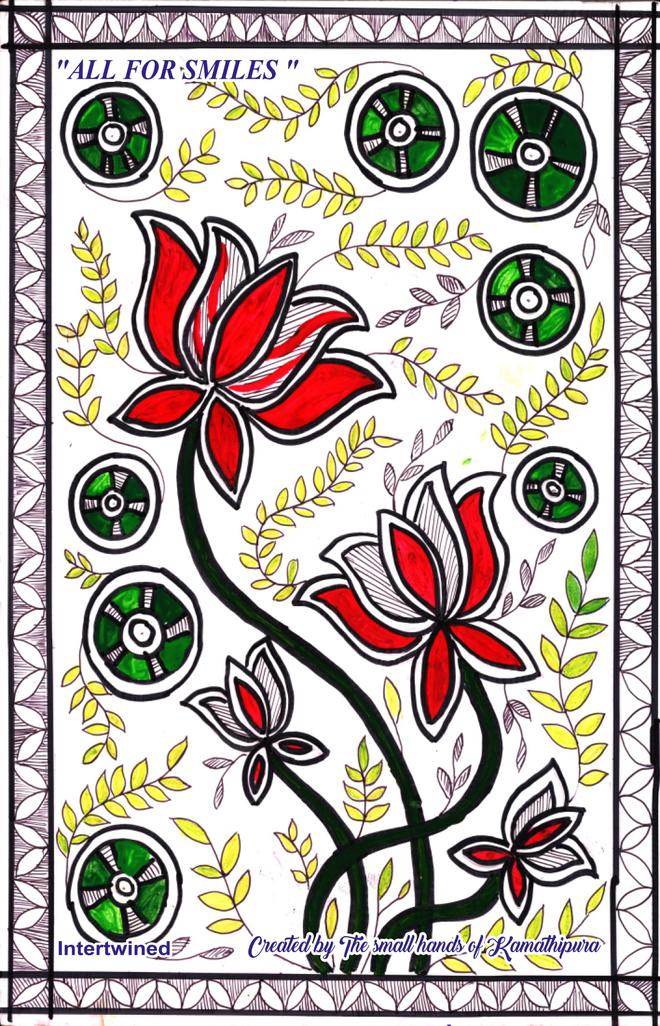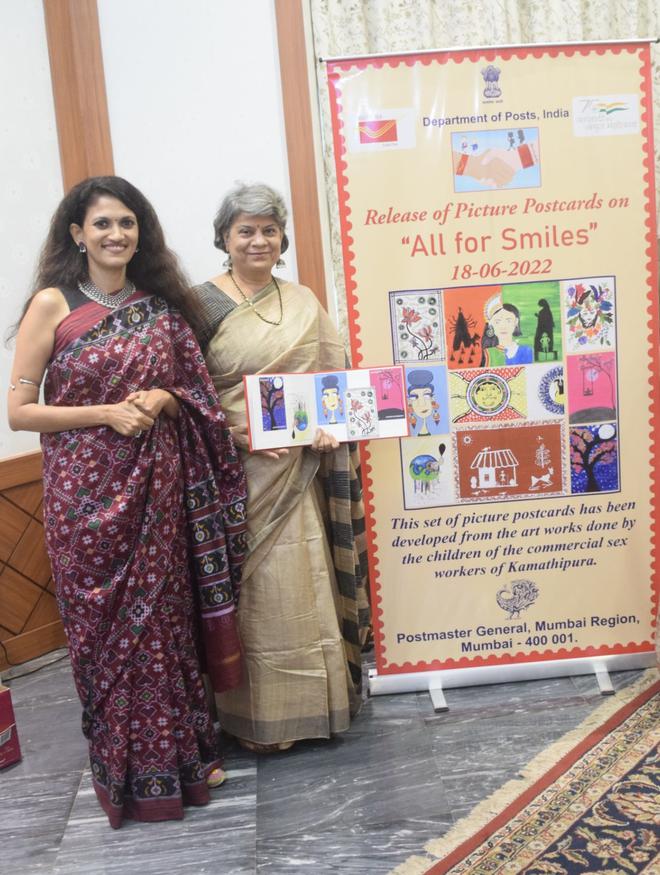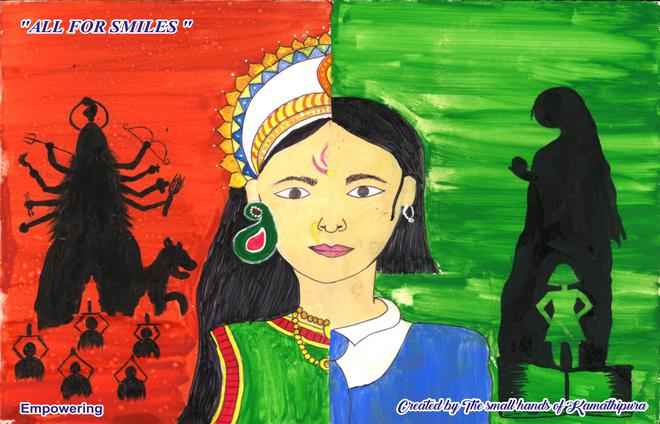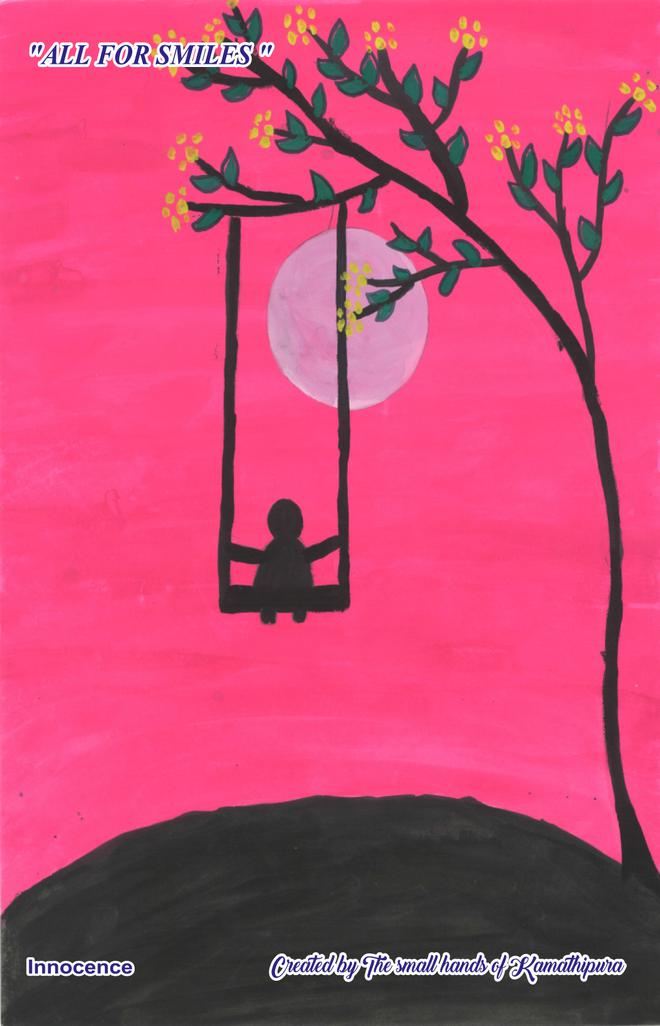A postcard featuring a woman’s face with a moustache, painted by the 14-year-old daughter of a commercial sex worker from Kamathipura, Mumbai, has a message. A QR code behind the postcard, when scanned, reveals that the artist has depicted the dual identity of women in Kamathipura, who have to play the roles of mother and father to their children.

Another postcard, title Intertwined, features stylised flower stalks, with green leaves and bright red petals. The colours are different but the parts of the plant are intertwined by Nature, each with a specific role to play. Yet another postcard, Innocence, shows a child on a swing, symbolising the innocence of childhood, which the artist says she has always craved.

Ten such postcards made by children of sex workers from Kamathipura, the oldest red-light district in Mumbai, deliver messages of hope, innocence and optimism. The names of the young artists have not been revealed to protect their identity. The set of postcards, which costs ₹180, and contains each artist’s vision in a QR code, was recently released by Bhagat Singh Koshyari, Governor of Maharashtra, at Raj Bhavan in the presence of the children, social workers and officials of India Post, in a massive boost for a demographic that is usually ignored by the public and the system.
The postcards are one of the by-products of sustained intervention by Swati Pandey, Postmaster General of Mumbai region, that has made a difference in the lives of women in Kamathipura.
Poonam Awasti, who works with Apne Aap Women’s Collective, an NGO, says it was a grand gesture of validation for the children and their mothers. The NGO has been closely associated with officers of India Post in their work in Kamathipura. “Each mother in Kamathipura is proud of the 10 youngsters who were invited to Raj Bhavan. Their paintings will travel across the world and it has motivated the children to dream big and empower themselves,” says Poonam.

Swati says it all began in 2021, during a workshop on savings and investment in connection with the Sukanya Samriddhi Yojana, a savings scheme for the girl child, in Kamathipura. Swati happened to hear the women speak in Bengali. She spoke to them in the same language and the women, though startled, gradually opened up. Swati asked if they were saving for a rainy day or for their children.
“That was in October 2021. I wanted to help them begin banking and save for themselves and their children. That is when they told me they did not like going to a bank or post office because men often look down on them and they feel inadequate and ignored,” she says.
Women empower women
Although there was a post office in Kamathipura, the women told Swati that they would feel comfortable only if it had women in all the posts. Swati assured them that she would convert it into a women-only office.
“I visited the office, and saw that it was a ramshackle building. To convert that into a women-only post office would, somehow, be demeaning to the women. So, it was spruced up, upgraded and computerised. Kamathipura Gali No. 8 Post Office is now one of our best-kept post offices. It is the first ‘safe space’ of its kind post office branch in Mumbai.”
The next step — to staff it with women — proved to be challenging, as many women feared that their families would be displeased about them working in the Kamathipura branch. Swati counselled and trained select women officers to help the sex workers empower themselves.
The post office was opened on December 21, 2021. Sweta Karle, Post Master of the branch, is proud to be part of an intervention to help women from disadvantaged backgrounds. “Many of them have opened post office savings accounts and learnt the basic steps of banking. We have also helped them secure Aadhar cards for their children.”
Swati liasioned with the departments concerned to open a window to secure Aadhar cards for people with no identification papers, usually the poorest of the poor. The post office at Kamathipura now offers Adhaar card enrolment, in addition to banking services. “Children of sex workers who have no birth certificates or verification of paternity, now get Aadhaar cards. We also connect the women to government functionaries and schemes.”
Beyond banking
On the sidelines of a wellness camp, Swati organised a painting competition. Pleasantly surprised to see the artistic skill of the youngsters, she wanted to use them on post cards. To get more works to select from, canvas and paints were given to the children and they were told to paint whatever they wanted.

Of 35 paintings, 10 were selected and postal employees interacted with the children to understand what was depicted in their works. These explanations have been QR coded for buyers to scan and read. The postcard sets are available at select post offices and at the main General Post Office’s philately section in Mumbai.
“We have not stopped at that. Employees of Indian Postal Services are now teaching them computer skills and I plan to hold an exhibition of the 35 paintings,” says Swati.







